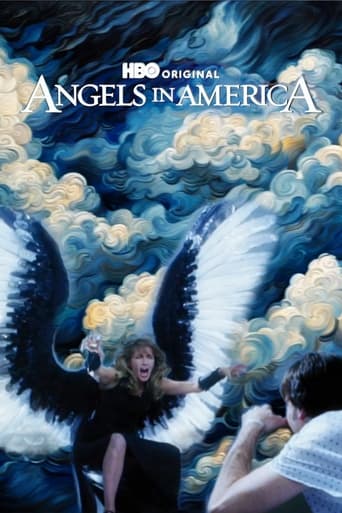bkoganbing
Angels In America may not have the cast of thousands that epic films are supposed to have. It has the length, but more to the point it has the heart. Acquired Immune Deficiency Syndrome is still very much with us, AZT is still the preferred method of treatment and control, but we can thank God and a lot of concerned activists that it is not the rare item reserved for the privileged few as we see here.This epic takes it cues in structure and format from such big screen films as Boogie Nights, Magnolia, and later on Crash. A select group of individuals, all fictional but based on people that Tony Kushner knew no doubt. I spotted a few in their I knew including flashing glimpses of myself in passing. That made for some uncomfortable viewing at certain points, but it was appreciative.One real person is here and possibly in a couple more generations people will look at Roy Cohn and ask could such a monster exist? I'm here to say he very much did exist. The Jew who turned his back on his own people, the gay man who refused to admit it to himself because he saw his people as weak and oppressed. These people exist, I knew a gay man who absolutely refused to admit his same sex attraction, he's still with us involved in right wing homophobic groups. And as for his Jewishness he renounced that religion and converted to Russian Orthodox. Talk about self hatred. These people are very real and in positions of power they are deadly.Roy Cohn is played here by Al Pacino and Pacino gives us one bravura performance as the dying monster who gets for himself the precious and at that time rare AZT to prolong a miserable existence. He's the self hating gay who moves with the elite who use homophobia obtain and retain power. Cohn first got public attention as one of the prosecutors in the famous atomic spy case. With what we know now there's no doubt Julius Rosenberg was guilty as charged. What Ethel's role in the case remains murky, she was a devoted wife and a believer in Julius's Marxist ideals. The government however wanted a confession from Julius and Cohn sought to get one. He held Ethel's life in the balance and neither Rosenberg would give up their crime or their accomplices if there were more. The bluff was called and Cohn with the zeal of a rabid dog pushed for her execution.In his miserable last hours on earth Cohn resisting the grim reaper is visited by Ethel Rosenberg and who could blame her for exacting some sadistic torment of Cohn. Her spirit is one of many played by Meryl Streep who took her cues from Alec Guinness from Kind Hearts And Coronets. With two great players like these, these moments in the film are choice.Others in the cast are Ben Shenkman another Jewish gay man involved with Justin Kirk who has come down with AIDS. There's Jeffrey Wright playing a black gay man who is nurse to both Pacino and Kirk. Shenkman works in the xerox room of a white shoe law firm that Cohn has his hooks into and his fair haired boy there is Patrick Wilson, a Mormon married to Mary Louise Parker but who has some same sex attractions.This is quite a mix of characters and away from Pacino and Streep my favorite moment is Shenkman who has broken under the strain of the health issues around Kirk got himself involved with Wilson. When he goes to the law library and reads some of the decisions, the inhumane decisions that Wilson has written for his senile judge for whom he is a clerk, the rage comes forth. He shames Wilson, but in a large degree he expiates his own sins.Pacino as Cohn, Streep as Rosenberg and many others and the rest of this stellar ensemble have created a masterpiece. This will last for centuries as a monument to the many who died, many whom I knew and loved and those who survived and fought to retain dignity and hope.
jcduffy
As I suspect is true of most of the people who assigned this film ten stars, I am a huge fan—yea, verily, a devotee—of the *play* "Angels in America." When I heard that HBO was turning it into a miniseries, I was duly thrilled, and that excitement carried me through my first viewing of the broadcast with only a minor sense of letdown. I recently re-watched the film over several evenings, and with the added distance of several years, my disappointment in the film is stronger. The play deserved a better screen adaptation than this.The acting, I'm pleased to say, isn't one of the major problems. With one exception, the cast do a fantastic job. I don't have the space to single out every actor for the praise they deserve, but I do have to make special mention of Jeffrey Wright's Belize (Ma cherie bichette!) and Meryl Streep's Ethel Rosenberg. The one weak link in this cast is Emma Thompson. She's reasonably believable as the Angel, though hardly an obvious choice. But she's too British to pull off Emily, the Italian American nurse (she doesn't even remember to keep up the accent), and she's too posh to play the psychotic homeless woman (again, accent). If you're going to do the actors-playing-multiple-roles thing, then Thompson needs to work in all three roles.The film's biggest problems lie in the directing and possibly the editing. The pacing is spotty, especially in Part 1. Some scenes play out too slowly: for example, Roy Cohn's first scene, with the phone, which isn't as frenetic as it's supposed to be; or the "quartet" scene, where we watch the two couples—Harper and Joe, Prior and Louis—in overlapping crisis. Other scenes play out too fast: the first meeting of Joe and Louis in the washroom, for instance, which moves too quickly to build up much sexual tension between them.There are missteps in tone right from the beginning of the film. The rabbi's opening monologue is too light, too feel-good, too Hallmark channel or Steven Spielberg. And the confessional scene between Louis and the rabbi shortly afterward, which works on a stage with minimal scenery, becomes unbelievable when it's placed at the cemetery entrance, with people passing behind and a whole row of rabbis listening in—and the coffin, the central presence in this scene as originally written because it symbolizes Prior's mortality and reminds us that Louis is a person who abandons people who have claims on his love, nowhere to be seen.But the biggest problems with tone surround the Angel's appearances. Kushner warns in his playwright's notes that unless "the director and designers invent great, full-blooded stage magic," the results will be "disappointing" and "ineffectual." Now, on a stage, in a live theater, the special effects used in this film would have more than fit the bill for "great, full-blooded stage magic." But on screen, in the age of CGI, the special effects didn't come across as that spectacular. A major failing here—paradoxically—is Nichols's insistence on using wide shot to show us the scale of what they created. Again, I'm sure that live, on set, the staging of the Angel's appearances looked amazing. But on screen, it just looks like Emma Thompson hanging from a cable way up in the air (and wriggling around in a funny way) in a room with abnormally tall ceilings. Sci-fi has spoiled us, Nichols. Unless you have the budget to compete with the scale of a CGI blockbuster, don't try. I'm willing to bet money that designing special effects on a smaller scale, relying more heavily on close-ups to fill our vision with wonder, would have produced more spectacular results. This would have been especially important in the wrestling scene, which is supposed to be deathly serious but was so over-the-top that it actually ended up coming across as slapstick.I have a similar complaint regarding the use of sex in the Angel's appearances. The Angel wasn't a convincing erotic presence because we were shown too much. Wide shots of the Angel and Prior copulating in mid-air wreathed in fire, or the Angel and Hannah locking lips and thrashing around amid fireworks, weren't as impressive as I'm sure they sounded on paper. It just looked, to borrow a line from the script, ungainly. Again, close-ups—glimpses of naked flesh, eyes and mouths in ecstasy—would have been more effective. The close-in shot of Hannah falling back onto the bed in post-coital bliss was more emotionally powerful, and a more striking piece of stage magic, than the wide shot that preceded it.Some final remarks about Kushner's rewrites for the screenplay: I regret the loss of the magic realist scene in the Mormon Visitors Center, between Harper and Prior—but I'm prepared to sigh and say, "Well, you can't preserve everything, that's why the movie's never as good as the original." The additional scene between Hannah and Joe near the end of the movie, at the entrance to the subway, was a worthy addition, an excellent way to provide more closure for Joe's storyline. Throughout the movie, religion was more prominent than it had been in the play: Hare Krishnas chanting in the street, the gospel choir at Belize's friend's funeral, the apparently Amish choir outside the subway. That added a nice dimension to the work. I am baffled, though, by the unhelpful additions to the scene between Hannah and Joe at the Visitors Center, and that trite line about "Hold to what you believe" is...an embarrassing stain.I'm probably coming across as a perfectionist. But "Angels in America" is an outstanding work that deserves perfection. I've seen films so good I'm prepared to hail them as perfect. I would really have liked this to be one of them, but it wasn't.
Jinn
I picked up the 2-disc DVD at the video shop (I love how they're still called video shops... :), - and it's set in 1986 ... My mother and I thought "Angels in America" would be brilliant with the cast, the awards and the angels...When I hire a movie, I watch the whole thing to see how it turns out... But this one, hurry up & get to the end already!!! My mother kept on saying "this is a terrible movie," referring to the uber-angst, and lack of angelic presences and I could have done without the religious overtones. Many Non-Christians also believe in Angels.My mother and I were very disappointed by there being hardly any angels and while I like Emma Thomson, her serious PMT Angel didn't do much for me (despite the awesome effects). Touched by an Angel? How about F***ed by an Angel? .... The Angel's egoism and screeching I felt off putting and cringe-worthy ... and the way the Heavens were failing, and the way they were all carrying on up there. What big wusses. How very reassuring ... NOT! I liked how the movie was set in the 80's and the characters were interesting, and complicated ... though honestly I believe that much of the hoo-haa could have been cut out, tightened up and made into a 2 ½ hour movie. The performances I liked best were Mary-Louise Parker as Harper, Justin Kirk as Walter. And Emma Thomson's Angel - minus the hollering.It did have some wonderful messages and pearls of wisdom about accepting homosexuality (I am bisexual myself) and those with AIDS, and believing in yourself, accepting yourself, standing up for yourself, about the body being the garden (or temple) of the soul, that we're all on a journey of our own choosing and we can choose to make it a great one ... and the message that humanity was evolving But I, I, I, I, Iiiiiiii honestly thought it could have been much better.







